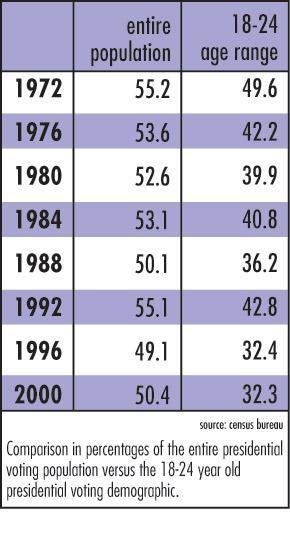College age voters might be the key to winning the 2004 presidential election, according to a recent survey.
Harvard University’s Institute of Politics conducted a survey polling 1,201 undergraduates throughout the nation. The survey found 59 percent of undergraduates said they would definitely be voting in the 2004 election.
These “Campus Kids,” as they are called in the survey results, are significant because they are not aligned with a major party or ideology.
Dan Glickman, director of the Institute of Politics, said in an official statement that “Campus Kids” could be the swing group of the 2004 election.
“This is an enormous reservoir of potential voters and volunteers, almost 10 million strong, who can be channeled to winning campaigns if they are nurtured,” Glickman said in the statement.
Similarly, candidates for the 2003 Louisiana gubernatorial election already have begun taking a hard look at the 18 to 24 year-old demographic.
Buddy Leach, a democratic candidate, has shown interest in the student vote by providing a link on his campaign site outlining his plans for economic development that pertains to students.
Bobby Jindal, a republican candidate, already has spoken to several student organizations at University and said a large number of his volunteers are college students.
Even with the known impact students may have on an election, the reason most candidates do not reach out to college campuses is because they know students still will not vote, said political science Chairman Wayne Parent.
“The problem that LSU has with gubernatorial candidates is unless the appearance is covered by the media statewide, candidates are not going to spend much time on the campus because they know not too many students are going to vote,” Parent said.
While 59 percent of the students said they would vote in the 2004 election, numbers from previous elections show that 59 percent may be too high.
According to the census bureau, only 32.3 percent of college-age voters, 18 to 24 year-olds, voted in the 2000 election.
Parent said 59 percent is too high of a percentage because students say they will vote even if they do not plan to vote.
“Students say they vote, but it’s inconvenient for students to vote,” Parent said. “Students have a lot of other things going on in their lives.”
Kate Bratton, a political science assistant professor, said the reason for low turnout among students is based on a lack of interest in the issues.
“Some of the things that drive elections, particularly local elections, like property and education issues, are less relevant for college kids,” Bratton said.
Mark Walker, kinesiology senior, said the reason most students do not vote is because they do not feel the political issues discussed during the election will affect them.
Some organizations look to improve student political awareness.
Youth Elect, a non-profit, non-partisan organization, hopes to change how students look at politics.
Rhett Morris, Youth Elect executive director, said the organization’s goal is to educate young people and open more doors for them in politics.
The organization is based in Baton Rouge and has scheduled a conference on campus in October, featuring young adults who currently hold political positions.
Morris said he hopes the conference will show students how young people can make a difference in politics.
Institute finds students crucial for election
June 12, 2003

Institute finds students crucial for election





